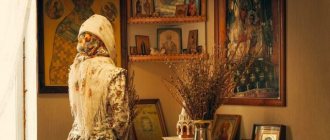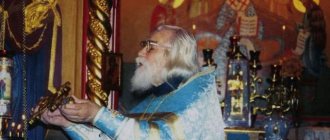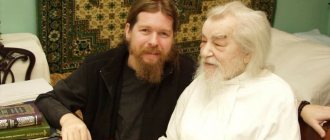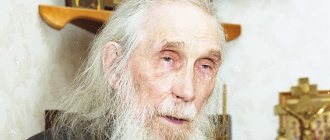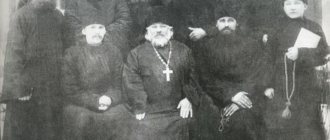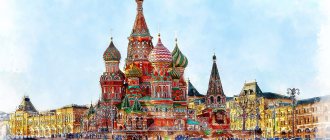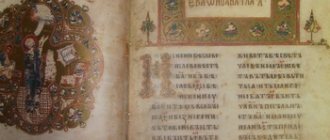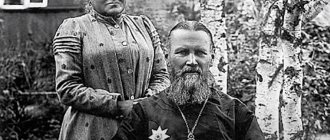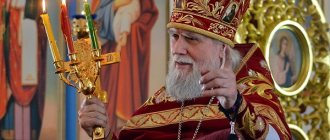| Theodotus | |
| Birth name | Feodot Zakharovich Koltsov |
| Religion | Orthodoxy |
| Date of Birth | unknown |
| Place of Birth |
|
| Date of death | March 8 (20), 1873 |
| A place of death |
|
| A country |
|
Wikipedia has articles about other people named Filaret.
There are articles on Wikipedia about other people with the name Theodotus and the surname Koltsov.
Hieroschemamonk Theodotus
(
in the world Theodot Zakharovich Koltsov
; d. 1873) - hieroschemamonk of the Kozelskaya Vvedenskaya Optina Hermitage.
Biography[ | ]
There is practically no information preserved about the childhood and worldly life of Theodot Zakharovich Koltsov, and other biographical information about him is very scarce and fragmentary.
Optina Pustyn on a coin of the Bank of Russia
His “ monastic exploits”
“He began in 1834 in Optina Hermitage under the leadership of schema-monks;
in 1841, Theodotus was tonsured a monk with the name Philaret
and appointed collector; he was soon ordained a hierodeacon, and in 1849 a hieromonk[1].
In 1851 he moved to the Gethsemane monastery at the Holy Trinity Sergius Lavra; there in 1853 he accepted the schema with the name Theodotus
and was appointed confessor of the entire brotherhood[1].
Seven years later, Father Theodotus retired into the depths of the forest and surrendered to silence. At the site of his solitude, the Hermitage of the Holy Paraclete was built under the command of Elder Theodotus. In 1863, he returned to Optina Pustyn, where he lived until his death on March 8, 1873, edifying the monastic brethren with his zeal for prayer and worship, his humility, simplicity and sincerity, attracting many spiritual children and admirers to himself with his virtuous life.
Theodotus Koltsov was buried in his native Optina monastery.
The monastery is the promised land
The monastic period became the pinnacle of Father John's ministry. Here he received from the Lord the energy of strength for many years, during which all sides of his spiritual talent were revealed, here true senile service appeared in him.
The air resounded with the sound of bells, pouring joy into the city and its surroundings when the new monk entered the monastery gates. We celebrated the day of remembrance of the abbot of the Pechersk monastery, the Venerable Martyr Cornelius*********. And everything around testified that a life given to God is blessed by Him forever.
Monastery! Promised Land! Desired and suffered! How long it took Father John to get to her! His soul was filled with gratitude to God for everything: for the past, present and even for the future. With this feeling, he fell to the saint’s shrine, brought it to God during the Divine Liturgy and, hiding his joy behind monastic severity, went to the governor, Archimandrite Alypius. He brought his brother to the cell, which became his home until the end of his days on earth. The word the governor’s father said at parting: “We will carry you out of here,” turned out to be prophetic.
The Pskov-Pechersky Monastery in 1967 was literally a warrior-hero. His armor was not walls and towers (what could they mean at that time?!), but the spirit of the inhabitants. With prayers and fearless courage, as recently as 1961, they repelled the siege of the all-powerful state, which was again attacking the Church. The inhabitants, former warriors, exchanged their soldiers' tunics for monastic cassocks. They knew well the value of life. And just as they did not give up their earthly homeland to the enemy, could they have given up their heavenly fatherland, acquired in the suffering of the hard times of war? Having accepted living faith into their hearts, they armed themselves with the fear of God in order to fight against sin. Faith in God, love for God and prayer sanctified the life of the monastery.
The monastic period became the pinnacle of Father John's ministry. Arriving at the monastery already at the end of his life’s journey, he received from the Lord energy and strength for many years, during which all sides of his spiritual talent were revealed, and here true senile service appeared in him. Everything in the monastery aroused deep reverence in his soul. The walls and temples resurrected a history rich in events and spiritual life. The inhabitants, led by the governor, are godly elders. Pilgrims flowing to the monastery from a godless world drowning in sins were perceived as true devotees of piety. Father John saw the people in the monastery fence as angels. Often from the crowd that accompanied him from the temple, his cheerful exclamation was heard: “What are you doing, dear, what are you doing?!” What are the enemies here? There are all angels around me, and you too.”
Father John became a seven-day hieromonk. This means that for a month his soul was nourished by the abundance of grace from a full circle of services: liturgy, evening service, confession, prayer services, memorial services. This was the joy of the fullness of communion between the earthly Church and the Heavenly Church. His thoughts and feelings, freed from the cares of life, ceased to manifest themselves in visible trifles. The soul matured in all manifestations of monastic life the Almighty hand of God. The monastic vows that guided Father John while living in the world were the unbreakable fence where the main treasure of his soul was kept - the love of God. She taught Father John obedience to God's Providence. He did not look for the source of either his troubles or joys in people. He accepted everything from the hand of God. He even blessed ill-wishers and enemies as instruments of God’s Providence. Obedience to Christ is the main thing. In the fulfillment of this vow, the inner world of the elder novice was revealed. Father often reminded the monastery inhabitants:
“Obedience is a chain from the Lord through the hierarchy to the monk.”
Many have heard from Father John that the vicar in the monastery is a shepherd, and all the rest are the flock: “God tolerates him, and He Himself will deal with him, but in us He now sees impatience and disobedience. This is what expelled our first parents from paradise, and it is what expels peace from our souls. Acquire a peaceful spirit - and not only will you be saved, but also many around you.” Father John brought calm into the lives of the brethren and directed them not towards rebellion and grumbling, but towards patience. He often said:
“If there is nothing to endure, how will we learn patience - this most precious virtue? It is not the place that saves a person, but patience. You can't run away from yourself. And you will bring the same passions to another monastery, and again everything around will be bad.”
Archimandrite Philaret (Koltsov)69 recalls: “I’ll come to Father John excited, and I’ll unleash my displeasures and complaints against the elders on the elder. The confessor does not help, the novices do not listen. Father John is silent and does not interrupt. I’ll speak out and calm down. And the priest will ask several such questions that I begin to understand that I was wrong. And Father John sums it up: “You see for yourself, you need to look for guilt in yourself, as you find it, the circumstances will change.”
“Non-covetousness is alien to sadness,” write the holy fathers. And Father John’s Easter-bright face testified to his non-covetousness without any words. Always calm and joyful, he repeated: “A person with a grateful heart never needs anything.” Father John’s non-covetousness extended to the point that at the end of the earthly vale he was left with only a “death suitcase”, where everything down to the smallest detail was prepared for burial, and there was nothing to distribute. The period of wandering, when all his care was only about the House of God, accustomed him to such non-covetousness that he did not look for anything for himself, entrusting the care of himself to God. The only thing he allowed himself unlimitedly was the acquisition of good deeds for Christ's sake. In this he was tireless and insatiable. True non-covetousness led him to the acquisition of the Holy Spirit.
The chastity of Father John cared only about the purity of the heart. “Blessed are those who are pure in heart, so that they will see God” (Matthew 5:8). Love for God protected him even from thoughts. And that which causes lust in a passionate man, in the soul of Father John gave rise to glorification and thanksgiving to God’s wisdom: “God saw how my flesh was woven, and how wonderfully I was made by God’s command. Sowing—the conception of a new life—isn’t this a miracle?” Defending the “myrrh-bearing women” working in the monastery from attacks, Father John said to the zealots of the ancient order: “That’s how it is, but didn’t the Lord bless the tonsure of the first worker, the Venerable Vassa, in our monastery? And is it not from the labors and sweat of Saints Jonah and Vassa70 that we feel the grace in the Assumption Cathedral71? I don’t know how it should be in other monasteries, but I know for sure that in our God’s blessing mothers are also saved.”
He came to the monastery already fully established in his monastic vows, and no one saw his struggles, but the fact that the spiritual fruits blossomed in Father John to a perfect ideal was obvious to everyone. Spiritual enlightenment of his mind and heart came to him, and with it a clear knowledge of the ways of salvation in the present, seemingly such an unsalvageable time.
Recalling the first year of his life in the monastery, Father John said that at this time the feeling of separation between the visible earthly and the invisible eternal was erased to such an extent that he ceased to perceive it. All those living now and those who once lived, and those who today stand at the throne in the monastery church, and those who have stood at the Throne of God for centuries - one family, sealed with the spirit of God's Love - the ark of the saved. And they are all here now, nearby. His heart heard the sounds of the otherworldly world.
And the more acutely this feeling emerged, the stronger was the heartache for a world perishing in unbelief. Later, these experiences dictated to him many letters to those living in the world and yearning in soul for the Truth of the saving path: “At this time, when the world is becoming impoverished in the spirit of Orthodoxy, maintain faith and trust in God, do not waver, do not complain, maintain love for the erring and pity for enemies - this is the path of God's truth. This means working out your own salvation.”
Father John spent only a few months in his speculative understanding of the monastic way of life: services, prayers in the twilight of a cell illuminated only by a lamp. Life powerfully began to make amendments to such an “ideal” life. Having blessed the man in passing, he ran into his saving solitude. But, leaving the petitioner in the monastery courtyard, without giving him a minute, he brought the memory of him to his cell in his heart for the whole day. It destroyed the peace in my soul. He began to pray to God for admonition. A vision from the recent past was resurrected in my memory, and the words of the angel again sounded in my heart: “You will be wandering all your life.” Doesn't this mean that in monasticism his destiny is to console people, to bear the burdens of life with them in prayer, directing this cross-bearing in a salvific direction?
Thoughts came about the monastic life of the dear Glinsky elders. He himself saw how they, nurtured by God in the solitude of the desert, in hermitage, opened their hearts and souls to the suffering in order to lead to God, “if possible, some.”
Father John also remembered his dream: Elder Ambrose of Optina in a crowd of laity and himself, awaiting the elder’s blessing. He understood everything. Thus, by the grace of God, he received an answer to his perplexities. At the end of their lives, many holy elders took upon themselves service to the perishing as the highest monastic feat. The Monk Seraphim of Sarov recalled the final feat of his monastic path - leaving the seclusion to people. And a later letter-testament of spiritual father Seraphim (Romantsov) confirmed the conclusions of Father John: “Remember my love for you, for the sake of which I neglected my own benefit, but always sought only your benefit: I sympathized with you all and sympathized with you in all your sorrow... Ah , my beloved fathers, brothers and sisters. Reward me with your tearful prayers to God for my love for you, for you were all in my heart.”
The peace and tranquility that settled in his soul informed Father John that he understood everything correctly. The novice monk accepted God's blessing for his clergy and became a debtor to both monks and laity - to everyone whom the Lord would send on his path. And Hieromonk John (Krestyankin) went out to the “hundreds of hail,” while enduring many reproaches thrown both in the back and in the face: “As he was the parish priest, so he remained!”
And the path to the monastery, which Father John promised to pave for the Kasimovites, very soon turned into a road. Dean Alexander72 said more than once: “And what kind of Kasimov is this? Shouldn't we move him to the Holy Hill? There are so many Kasimovites coming to us now!” But soon pilgrims from Orel, Moscow, Leningrad, and Ryazan flocked to Father John. The Oryol residents claimed primacy by birthright: they began the life path of Father John. Muscovites did not yield: his pastoral ministry began in Moscow. Leningraders were encouraged by the long-standing rights of proximity to the Pskov-Pechersky Monastery and to Elder Simeon73. Father John served in the Ryazan region for the last ten years and became family to her. And you can’t count who and where the Lord has brought to this path-road. “We live on Mezhdunarodnaya Street, so we ourselves have become international!” - the priest joked. A community very soon formed around Father John - an invisible “monastery”, without vows, without tonsure, working for God for the salvation of the soul, for the good of the Church and neighbors. And many, many lamps were lit in the world from his monastic spirit. There were in it young and old, learned and simple, all with love and desire surrendered to obedience on the path to salvation. What did his workers not do! Sisters - modern myrrh-bearing wives served their neighbors from their estates, and more often from their labors: they sewed shrouds, vestments, and paramanas. The brothers carved crosses, painted icons, published books, and worked on dissertations.
The experience of communicating with a variety of people and in the most difficult life circumstances nurtured in Father John such a Christian teacher who saw a person to the depth where God’s plan for him was kept. Unmistakably and unobtrusively, without interfering with his will in the God-given personality, he helped a person find the only path that was determined for him by the will of God. He taught me how to take root on it. Every now and then I heard from the lips of Father John:
“Children, children! Hurry up to do good! Don't be stingy in doing good! This is what is ahead of us, sing eternal life and will meet us when we leave the earth.”
